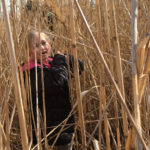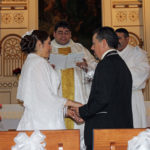By Barb Arland-Fye
The Catholic Messenger
IOWA CITY — In preparation for the Synod of Bishops on the Family this fall at the Vatican, Bishop Martin Amos has submitted his report on the reality of families today in the Davenport Diocese. Members of the Diocesan Pastoral Council (DPC) received a synopsis of the report during their March 21 quarterly meeting at St. Patrick Parish in Iowa City.

Chelsey Semprini and John Blough recite their marriage vows before Father Mark Weal at St. Ambrose Cathedral in Des Moines in July 2014.
The synopsis provides insight about Catholics’ responses to a series of 46 questions related to a report on the 2014 extraordinary Synod of Bishops on the Family. Clergy, laity, members of various diocesan boards and targeted diocesan offices were queried, said Marianne Agnoli, the Davenport Diocese’s coordinator of Family Formation/Lay Ministry. Information was also gleaned from a parish/cluster marriage and family inventory.
Among the insights in Bishop Amos’ report:
The church and culture
Black and white thinking and pronouncements disconnected from real-life experiences of individuals will have no chance of being heard. The church should continue to communicate its teaching but reappraise the language used and the approaches taken — under the guidance of the Holy Spirit. Language that excludes, ignoring the reality that English is a living language and has changed dramatically, even in the last few decades, will not be heard.
Implications for catechesis
In the recent past, catechetical efforts at the parish level have centered on children. Numerous Catholics erroneously assume that formation ends with the sacrament of confirmation. Many adult formation programs emphasize preparation for ecclesial (church) ministry or narrowly focus on intellectual formation. Faith formation of adults ought to be at the center of the church’s planning and programming. The formational needs of those called to married life ought to receive high priority. Seminarians should continue to prepare for those ministries where most Catholics will meet their clergy: liturgy, preaching and one-on-one pastoral encounters. Young people respond best to witnesses, not teachers (unless they are also witnesses).
Marriage preparation
Marriage is not always treated as a vocation, as a response to a call to holiness — in catechesis or in Catholic schools, in marriage preparation programs, from the ambo, or even in vocations awareness. Renewal and improvement of marriage preparation is a priority in the diocese. Authenticity and experience are crucial components for many marriage formation programs. The use of mentor couples — in addition to retreat-type experiences — will be crucial in marriage preparation. Awareness of the vocation to marriage and family life needs to be part of the catechesis of children and teens. Preparation for marriage vows needs to be treated with the same seriousness as preparation for religious vows.
Ministry to families
Don’t write off those whose current situation does not match the vision of married life put forth by the church. It is difficult to accept the idea of God’s mercy unless one first encounters “flesh-and-blood” mercy from the church’s representatives; otherwise, any talk of God’s mercy will simply be seen as hypocritical. Once a foundation, a relationship, is established, growth in the direction called for by the church’s tradition can be encouraged.
Wounded families
The church is not often seen as a competent authority in the area of marriage, sexuality and family life. Some respondents mentioned that in their experience parishes have been helpful through the provision of counseling services, marriage renewal experiences and other forms of accompaniment. A list of trusted marriage counselors needs to be made available for referrals throughout the diocese.
Annulments
Concerning annulments: How can the process be simplified and streamlined? Comments to the questions indicated a great deal of misunderstanding regarding marriage law among Catholics. For individuals who have divorced and remarried without a declaration of nullity of their previous marriages, a fundamental question is raised concerning their exclusion from the Eucharist. Is the Eucharist a “reward” for gospel living or “medicine” for those in need of healing, an aid on the way to full communion? The reality is that people do not experience exclusion from the Eucharist as medicinal but as arbitrary and punitive. Theologically, the church needs to reflect on the nature of Eucharistic communion — both what it signifies and what it intends to bring about. Without endangering the teaching on indissolubility of marriage, might it be possible for the church to grant a dispensation to a Catholic in an irregular union to receive holy Communion, perhaps with the application of certain restrictions?
Cohabitation
Concerning the prevalence of co-habitation, the Christian community needs to put forth a positive and inviting vision of sacramental marriage. Individuals and couples will need to experience married couples (as well as clergy and religious) who live committed lives with joy and integrity.
Homosexuality
The pastoral care to persons with homosexual tendencies was the second-most commented-on section of the questionnaire. It is clearly an area of concern and confusion for many. The starting point in this area of ministry must always be the full human dignity and value of the homosexual person as a child of God. The language used by the church needs to be more nuanced. It seems that the church makes sexual sins — and especially those related to same-sex attraction — to be the most heinous sins of all. Can the goodness in a same-sex relationship be acknowledged while not agreeing that the genital aspects of same-sex attraction are good?
Family Planning
Most Catholics know little of Natural Family Planning (NFP): its history, theology, and application. The question of family planning is an area of life that most young people would say the church has no place. Many simply ignore church teaching in this area as irrelevant. For others, church teaching on contraception is the stated reason why they have left the church. For some, the exclusion of women from holy orders disqualifies the church from speaking on any issue that affects women. If the church is to promote NFP it needs the infrastructure to do so.
In response to the diocesan data gathered from the report for the Synod of Bishops on the Family, the following initial diocesan action steps have been proposed. Agnoli told the
DPC:
• Develop diocesan guidelines for marriage preparation and enrichment.
• Increase promotion and training of sponsor couples throughout the diocese.
• Increase diocesan NFP educational and instructional resources.
• Increase parish/diocesan resources for troubled marriages and families.
• Promote marriage enrichment activities for couples at various stages of married life.
• Offer instruction and resources for family catechetical programs.
“It’s an exciting time in the church,” Agnoli said, “with an emphasis on marriage and family life.”











